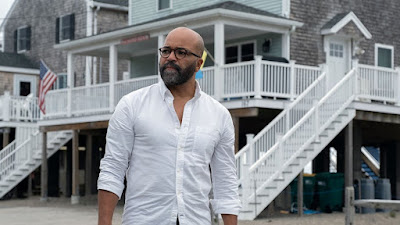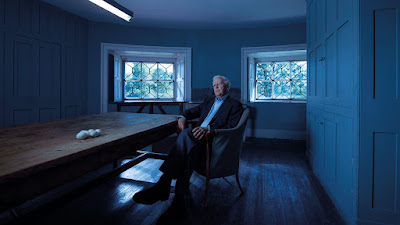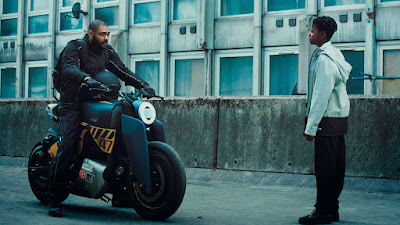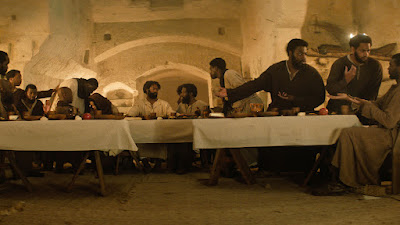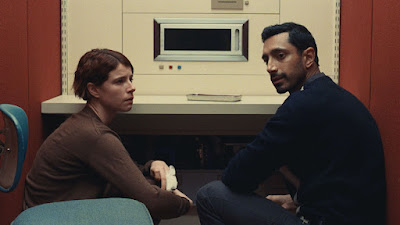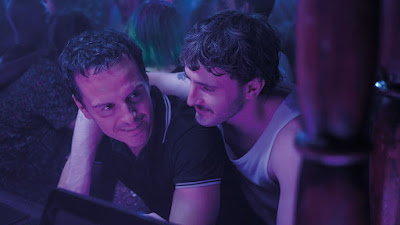NAPOLEON is rated R and has a running time of 158 minutes. It was released in cinemas today and will be released later in a director's cut on Apple TV.
Wednesday, November 22, 2023
NAPOLEON**
Saturday, November 18, 2023
AMERICAN FICTION****
AMERICAN SYMPHONY***
AMERICAN SYMPHONY is rated PG-13 and has a running time of 104 minutes. It played Telluride 2023 and will be released on Netflix on November 29th.
Friday, November 03, 2023
A HAUNTING IN VENICE**
BOTTOMS*****
BOTTOMS is rated R and has a running time of 91 minutes. It played SXSW 2023 and was released in the USA in August. It goes on release in the UK tomorrow, November 3rd.
Saturday, October 21, 2023
THE PIGEON TUNNEL*
Sunday, October 15, 2023
THE KITCHEN** - BFI London Film Festival 2023 Closing Night Gala
Behind the lens, production design did wonders with what I suspect was a small budget. I loved the grungy, vibrant, rotting, exciting, space of The Kitchen. It felt real somehow, and something worth fighting for, which is really important. This also felt disturbingly like the present - maybe because the budget to do anything too radical wasn't there - maybe because the film-makers were making a point - maybe because I am so familiar with the shooting locations I knew exactly where they were. Isn't it funny how people wanting to create the future always come back to my beloved brutalist notorious Barbican Centre? I also really loved the aural landscape of this film - the richness and diversity of hearing a cappella gospel; bass-thumping EDM; and classic tracks from Lord Kitchener. But films start and end with scripts and this one needed another pass.
THE KITCHEN has a running time of 104 minutes, is rated R, and will be released on Netflix in 2024.
ANATOMY OF A FALL****
ANATOMY OF A FALL has a running time of 152 minutes and is rated R. It played Cannes 2023 where it won not just the Palme D'Or but also the Palme Dog! It went on limited release in the USA this weekend and opens in the UK on November 10th.
POOR THINGS***** - BFI London Film Festival 2023 - Day 11
POOR THINGS has a running time of 141 minutes and is rated R. It played Venice and London 2023. It will be released in the USA on December 8th.
CHICKEN RUN: THE DAWN OF THE NUGGET***** - BFI London Film Festival 2023 - Day 11
CHICKEN RUN: THE DAWN OF THE NUGGET is rated PG and has a running time of 97 minutes. It opens on limited release in UK cinemas on December 8th and then on Netflix globally on December 15th.
Saturday, October 14, 2023
THE END WE START FROM** - BFI London Film Festival 2023 - Day 10
THE END WE START WITH has a running time of 96 minutes. It played Toronto and London 2023. It will be released in the USA on December 8th and in the UK on January 19th 2024.
THE ZONE OF INTEREST***** - BFI London Film Festival 2023 - Day 10
The film is inspired by, rather than an actual adaptation of, Martin Amis' troubling novel of the same name. Glazer strips away Amis' fictionalising to give us the stark truth of the Auschwitz concentration camp, informed by years of research and access to the site's archives. His film is actually filmed on location, with a replica of the camp Commandant's house built a few hundred yards from the original. There is a deeply authentic and disturbing sense of being in the presence of banal evil - in the landscape we have seen so many times in documentaries and in testimony from SHOAH.
The power of this film lies, I think, in the way in which it is meticulously constructed and the conceptual choices made by Glazer. The film is best described as working on three levels at once: the visual story; the sound design; and the score.
The first level is the visual story. This is almost entirely that of the Hoess family with much of the action taking place in their house, breaking only as Rudolf is sent to Berlin for a temporary reassignment. We are ensconced in the every day rhythms of the family - kids getting ready for school or playing in the pool - mother tending to her beloved garden or gossiping with her friends - servants laying the table. As Hedwig Hoess' mother arrives for a visit we realise just how well this working class couple has done under the Nazi regime. The daughter of a cleaner is now the matriarch in a luxurious villa, with servants, mink coats, jewels. Hedwig has her pick of the luxury items stolen from Jews and despite a rather provincial ugly look clearly has a liking for finery. As for Rudolf he is what his children claimed - a loving father with a fondness of horses. They swim in the lake and paddle in their canoe.
All of this is depicted with a natural casualness and intimacy that is afforded by strong performances from Christian Friedel (Babylon Berlin) as Rudolf and Sandra Hueller (TONI ERDMANN) as Hedwig. These performances are also enabled by a novel system of fixed cameras that allowed the performers to move through the villa more freely and stay in the moment.
The key point of the visual narrative that we see the camp walls and the chimneys and the endless smoke but we never actually see the horrors behind those walls. (As such, this film would work well as a companion piece to the similarly formally audacious and haunting SAUL FIA.) This gives the film a kind of deliberate claustrophobia and a tension born of a false division between the idyllic family life and its surroundings. Indeed, the only time we break away from the perspective of the Hoess family is when Glazer uses thermal imaging to show a little Polish girl - almost like the heroine of a fairy tale - leaving a trail of apples and pears for the prisoners in the camp at night. It's as if her innate humanity and goodness can only be shown as the negative of the Nazi evil that we see in broad daylight.
This fake isolation is corrected by the second layer or element of the film which is Johnnie Burn's sound design. Because while we may not see the camp and its victims explicitly, we hear them constantly. We hear the rumble of trains arriving and the screams of families being separated. We hear gunshots and horses rearing and panicked people. Most horrifyingly, we hear the incinerators burn. To be fair we also see this in our peripheral vision - the orange lights at night as another selection is made. And we see the impact of this sound - of this actual immersion in murder - on the family. One of the daughters sleep walks. The mother-in-law comes to visit and then flees, unable to stomach the sounds and smell of burning. Rudolf, we later find, has some kind of stomach problem. And even if his conscious mind does not acknowledge the horror, his body is revolting against it. Strangely, it is only the wife Hedwig who seems to exhibit no horror, who is only angry when she thinks she might have to leave "this paradise".
So we have the visual story of what is happening with the family - and then we have the sound design telling us what is happening just outside of our vision. Both of these are scrupulously real and researched and cognitively dissonant. It's the dissonance that makes the film so hard to watch and so haunting. The third element of this astounding film is Mica Levi's score. This can only be described as the element that gives us the emotional response to the dissonance - to the truth of Auschwitz and of Hoess descending the final staircase into immorality. It's a score like something out of a horror film, or how one might imagine Dante's Inferno to sound. It's aurally invasive and unreal and abstract and in some ways cathartic. Amidst this gentle family life, and off-screen constant rumbling machinery of murder, we need something that sounds like, and allows us, to scream in horror.
Part of me wishes Glazer had not broken our entrapment in this nightmare to show us footage of the modern Auschwitz museum. I feel the film may have worked better to not give us that escape, rather to mire us in hell. But this choice does not undercut just what a monumental achievement of cinema this film is. It is by far the most formally brave, and provocative film I have seen this year.
THE ZONE OF INTEREST has a running time of 106 minutes. It played Cannes 2023 where Mica Levi won the Soundtrack Award, Jonathan Glazer won the FIPRESCI prize and the Grand Prize of the festival. It also played Toronto, Telluride and London 2023. It opens in the USA on December 15th
Friday, October 13, 2023
BLACK DOG* - BFI London Film Festival 2023 - Day 9
BLACK DOG has a running time of 96 minutes and had its world premiere at the BFI London Film Festival.
ONE LIFE**** - BFI London Film Festival 2023 - Day 9
ONE LIFE has a running time of 110 minutes. It played Toronto and London 2023. It opens in the UK on January 1st 2024.
Thursday, October 12, 2023
THE BOOK OF CLARENCE* - BFI London Film Festival 2023 - Day 9
AD 33; Jerusalem. The apostle Thomas has a twin brother called Clarence who believes in knowledge, not faith, sells weed, and is deeply in debt to the local gangster. In yet another cockamamie scheme, Clarence thinks he will become an apostle too, to gain their protection, but they soon see through his schemes, with Thomas pouring scorn upon him. So Clarence decides to become a "new" messiah, replicating Jesus' "tricks" and raising the money from his believers to pay off his debts. Problem is, this newfound praise and money affords Clarence the opportunity to do something even more radical: to be good.
Jeymes Samuel (THE HARDER THEY FALL) may well be the most frustrating writer-director currently working. I had hoped his sophomore film, THE BOOK OF CLARENCE, would exhibit more tonal consistency and discipline than his debut feature, but my word this film is just as indulgent. All of which is disappointing because Samuel is clearly highly cine-literate, with a penchant for the excesses of spaghetti westerns and biblical epics. He clearly has a good imagination and no shortage of big ideas. But this film is neither consistently funny, nor ideologically radical. I was hoping for something funny and zany and gonzo - something approaching the dangerous dark satire of THE LIFE OF BRIAN. Instead, I got a film that was surprisingly straightforwardly pro-religion. What’s even worse is that in its serious moments, in the final half hour, we get some actually rather earnest and good acting from LaKeith Stanfield and Marianne Jean-Baptiste. But all of that is wasted when Jeymes Samuel can’t help inserting cheap gags. Dear lord this man needs a good producer, or editor, or mentor or something. Something to pin him down and get the best out of him.
THE BOOK OF CLARENCE has a running time of 136 minutes. It played London 2023 and will be released in the USA on January 12th.
THE HOLDOVERS***** - BFI London Film Festival 2023 - Day 9
Wednesday, October 11, 2023
NYAD***** - BFI London Film Festival 2023 - Day 8
NYAD is rated PG-13 and has a running time of 121 minutes. It played Telluride, Toronto and London 2023. It opens in the USA on October 20th in cinemas and on November 3rd on Netflix.
FOE** - BFI London Film Festival 2023 - Day 8
So let’s start with the sci-fi conceit. Writer-director Garth Davis (LION) has no track record in writing sci-fi, and maybe no interest in writing sci-fi, and it shows. He is, however, adapting a book by Iain Reid which may get into this in more depth. What we get on screen is the story of a woman, Hen, who has fallen out of love with her husband Junior, then falls in love with his AI Cylon replacement instead. This is a tale an old as time, or at least as old as Martin Guerre (better known to western audiences as that Richard Gere film SOMMERSBY). If you want to get into the nuances of how this might play out with AI alternates, then I would once again urge you to watch Ronald D Moore’s Battlestar Galactica remake. By contrast, FOE isn’t really interested in mining those nuances.
Okay, so grant the movie the grace of parking the sci-fi conceit to one side. How does it play as straightforward relationship drama? We are on stronger ground here thanks to strong lead performances from two very talented actors: Saoirse Ronan (LITTLE WOMEN) as Hen and Paul Mescal (ALL OF US STRANGERS) as Junior. But when two people drift apart simply through over-familiarity and isolation - when there is no actual dramatic event that brings them into free-fall (not even in this sci-if conceit) then what are we left with? Two hours of mild bickering and mild make-up sex. It just ain’t enough to fill a near two-hour running time.
This is all a tremendous shame as the crew is as impressive as the cast. I loved cinematographer Matyas Erdely’s sepia-toned interiors and drought-scape exteriors. I really loved the score by Oliver Coates, Park Jiha and Agnes Obel. In fact, it’s the score more than anything in the writing that reminds us we are in a sinister, dystopian sci-fi film. I also really loved some of Garth Davis’ visual flourishes, when they sporadically occur. There’s a great scene near the end which, without spoiling it, involves a vacuum and plastic, that was absolutely visually arresting. It just wasn’t enough to save me from boredom.
FOE has a running time of 110 minutes and is rated R. It opens in the USA on October 6th and in the UK on October 20th.
Tuesday, October 10, 2023
MAESTRO*** - BFI London Film Festival 2023 - Day 7
MAESTRO has a running time of 129 minutes and is rated R. It played Venice and London 2023 and will be released on December 20th on Netflix.
PRISCILLA** - BFI London Film Festival 2023 - Day 7
Monday, October 09, 2023
FINGERNAILS** - BFI London Film Festival 2023 - Official Competition - Day 6
I guess there's some interesting stuff here about the social pressures of the wellness industry making you second guess your own instincts. But we've seen this done better, darker, nastier and frankly funnier before. The only real saving grace of this version is Riz Ahmed, who is really very funny indeed.
FINGERNAILS is rated R and has a running time of 113 minutes. It played Toronto, San Sebastian and London 2023. It goes on limited release in the USA on October 27th before being released on streaming on Apple TV a week later globally.
DEAR JASSI*** - BFI London Film Festival 2023 - Official Competition - Day 5
DEAR JASSI has a running time of 132 minutes. It played Toronto and London 2023.
ALL OF US STRANGERS**** - BFI London Film Festival 2023 - Day 5
ALL OF US STRANGERS has a running time of 105 minutes. It played London 2023. It goes on release in the USA on December 22nd and in the UK on January 26th.

